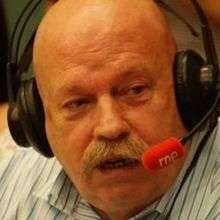José María Íñigo
| José María Íñigo | |
|---|---|
 | |
| Born |
José María Íñigo Gómez 4 June 1942 Bilbao, Spain |
| Nationality | Spanish |
| Occupation | Actor, radio presenter, television presenter |
| Employer | RTVE |
| Spouse(s) |
María del Pilar Piniella Merino (1984-present) Josette Nahmias (divorced) |
| Children | Daniel, Eduardo, José María (with Nahmias), Pilar (with Piniella Merino) |
| Website | www.josemariainigo.com |
José María Íñigo Gómez (born 4 June 1942 in Bilbao) is a Spanish journalist, radio and television presenter, and stage and screen actor.
Career
Born in Bilbao, Íñigo began his professional career in his hometown as he was hired by Radio Bilbao, and then by COPE. Shortly after he moved to London, from where he collaborated with different music programmes on Cadena SER. Back to Spain, he settled in Madrid, where he worked in radio music shows El Musiquero, El Gran Musical and Los 40 Principales.
He joined Televisión Española (TVE) in 1968 working in the show Último grito, created by Pedro Olea. Later he presented music programme Ritmo 70, directed by Pilar Miró. He became one of the most popular television presenters in Spain with the show Estudio abierto which he hosted from 1972 until 1975 and again from 1984 until 1985. Between 1975 and 1984 he presented other shows with a similar format, which included musical performances and interviews to celebrities or common people with curious stories: Directísimo, Esta noche...fiesta, and Fantástico.
After an hiatus, in 1993 and 1994 Íñigo hosted the morning show on Telecinco alongside Laura Valenzuela. Since then, he has worked for several variety shows, talk shows and reality shows on both public and private broadcasters. Since 2000 he has also worked for Radio Nacional de España (RNE).
Eurovision Song Contest
Over the years Íñigo has been associated with the Eurovision Song Contest. Between the 1975 Contest and 1976 Contest he announced the Spanish jury result. In 2008 his testimony for a Spanish documentary was used to claim that at the 1968 Contest the voting had been rigged by Spanish dictator Francisco Franco and that the United Kingdom should have won the contest, although he later clarified that he had just repeated a widespread rumour and that his words had been taken out of context.[1] At the 2011, 2012, 2013 and 2014 contests he provided the TVE Commentary. Íñigo was joined by Julia Varela for the 2015 and 2016 contests.[2]
Career on television
- Último grito (1968-1969) on TVE.
- Ritmo 70 (1970) on TVE.
- Estudio abierto (1972-1975, 1984-1985) on TVE.
- Hoy 14,15 (1974-1975) on TVE.
- Directísimo (1975-1976) on TVE.
- Spanish spokesperson in the Eurovision Song Contest (1975-1976).
- Esta noche...fiesta (1976-1977) on TVE.
- Fantástico (1978-1981) on TVE.
- Íñigo en directo (1986) on ETB.
- Las Mañanas de Telecinco (1993-1994) on Telecinco.
- ¿De qué parte estás? (1994-1995) on Telecinco.
- El Show de Flo (2002-2003) on TVE, co-host.
- Vivo cantando (2003) on Telecinco, co-host.
- Carta de ajuste (2004) on TVE.
- Supervivientes: Perdidos en el Caribe (2006) on Telecinco, co-host.
- El Club de Flo (2006) on laSexta, contestant.
- Destino Oslo, La Gala de Eurovisión 2010 on TVE, jury member.
- Spanish commentary for the Eurovision Song Contest (2011-present), on TVE.
- Así nos va (2013) on laSexta, section co-host.
- ¡Qué tiempo tan feliz! (2014-present) on Telecinco, panellist.
References
- ↑ "Massiel e Iñigo acusan a La Sexta de "urdir todo para favorecer a Chiquilicuatre"" (in Spanish). El Mundo. 6 May 2008. Retrieved 3 December 2009.
- ↑ Manu Mahía (13 April 2013). "TVE vuelve a confiar en José María Iñigo para comentar Eurovisión 2013". eurovision-spain.com (in Spanish). Retrieved 14 April 2013.
External links
- (Spanish) José María Íñigo's website
- José María Íñigo at the Internet Movie Database